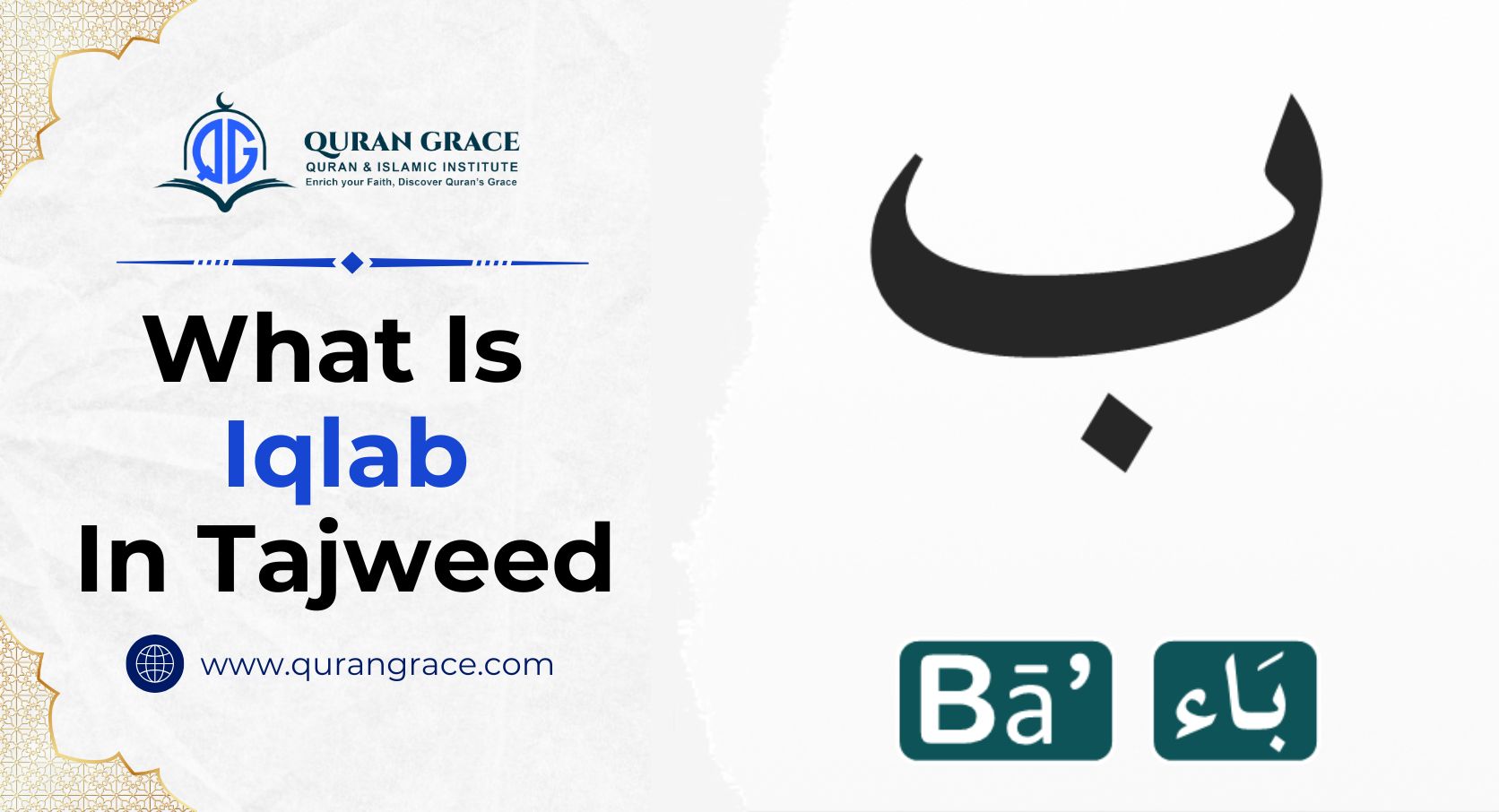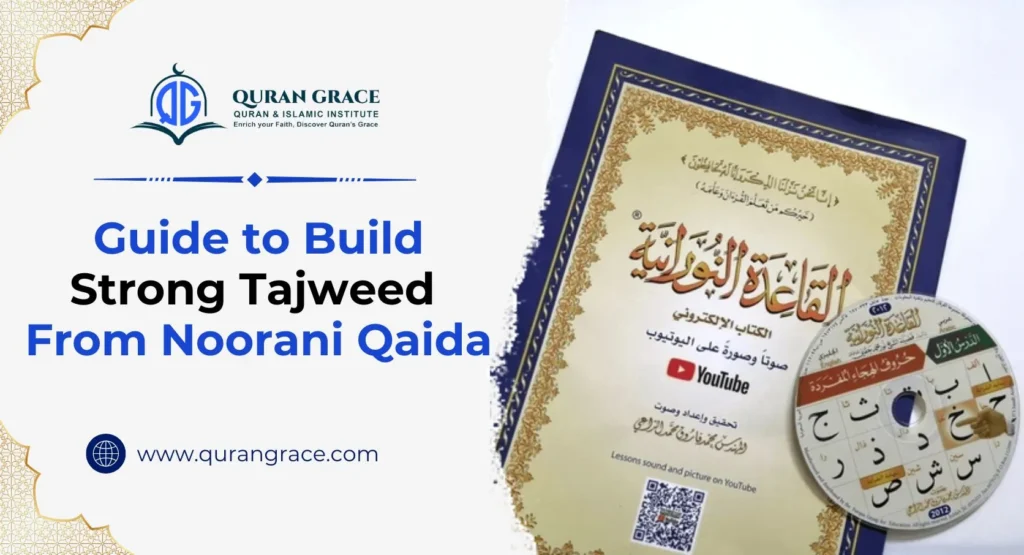To recite the Quran with Tajweed, one needs to fully understand the rules that are mandatory to learn. In this comprehensive guide, we will delve into the fascinating concept of Iqlab in Tajweed, a vital aspect of Quranic recitation that enhances the beauty and clarity of the text. It is important to understand what Iqlab means and what the various types of Iqlab are. Each type plays a crucial role in ensuring that the reciter achieves the correct pronunciation and intonation, which are essential for conveying the intended meaning of the verses.
Table of Contents
ToggleWhat Is Iqlab in Tajweed?
Iqlab in Tajweed refers to a specific rule that pertains to noon sakinah and tanween. The term “Iqlab,” which means to turn or transform, highlights the shift from noon sakinah or tanween to the sound of meem, accompanied by a gentle nasal quality. This change facilitates a smoother flow in recitation, enhancing rhythm and melody.
Iqlab is performed because it can be challenging to perform idgham or izhar when noon saakin and tanween precedes the letter “ba.” This difficulty arises from the distinct articulation points of the letters “ba” and “noon.” There is a similarity between the letters “meem” and “ba,” both regarding their characteristics and where they are articulated in the mouth. Therefore, grasping the rules of Tajweed Iqlab is vital for accurate Quranic recitation.
The Letters of Iqlab
Iqlab uses the letters noon sakinah or tanween, which, when they come before the letter “ba” (ب), are transformed into a meem (م) without harakah.
By creating a nasalized sound, this conversion maintains the recitation’s harmony and clarity. For the Quran to be recited correctly, it is essential to understand and correctly apply this rule.
Pronunciation of Iqlab
Iqlab entails converting the noon sakinah or tanween sound to the meem sound when the letter “ba” (ب) is added. The letter meem is pronounced with the lips closed together to produce this change. Only the letter “ba” undergoes this change because of how closely it sounds to Tanween.
To apply Iqlab correctly, native Arabs pronounce the noon sakinah or tanween clearly, without using any nasalization (ghunnah). When you get to the letter “ba,” change your pronunciation to the meem sound, making sure to close your lips clearly and without ghunnah.
This results in a smooth and accurate recitation of the Quran, adhering to the quran tajweed rules.
Note: To master Iqlab and the other important tajweed rules, you can join online Tajweed classes by Quran Grace and excel in Quran recitation like a pro-Qari.
3 Types Of Iqlab In Tajweed
To understand the concept of Iqlab in further detail, let’s consider all three types with Quranic examples.
1. Iqlab within a Single Word
This occurs when the letter “baa” follows a noon saakinah within the same word, requiring the reciter to convert the noon into a meem.
Examples include:
- (قَالَ يَا آدَمُ أَنبِئْهُم بِأَسْمَائِهِمْ) – The noon saakinah and “baa” are combined in the word “أَنْبِئْهُمْ.”
- (كَلَّا لَيُنْبَذَنَّ فِي الْحُطَمَةِ) – In the word “لَيُنْبَذَنَّ,” the noon saakinah meets the “baa.”
- (يُنْبِتُ لَكُمْ) – In the word “يُنْبِتُ,” the noon saakinah precedes the “baa.”
2. Iqlab between Two Words
This occurs when the letter “noon” or tanween appears in one word and the letter “baa” in the following word. Examples include:
- (مِن بَعْدِ وَصِيَّةٍ يُوصَىٰ بِهَا) – The noon saakinah is in one word, and the “baa” is in the next.
- (وَاللَّهُ عَلِيمٌ بِذَاتِ الصُّدُورِ) – Tanween followed by the letter “baa” in the next word.
- (وَمِن بَيْنِنَا وَبَيْنِكَ حِجَابٌ) – The noon saakinah is in one word, and the “baa” is in another.
3. Iqlab between Two Words with Tanween
This occurs when tanween is followed by the letter “baa,” regardless of the type of tanween (fath, kasra, or damma). Examples include:
- (وَاللَّهُ سَمِيعٌ بَصِيرٌ) – Tanween Dammah followed by “baa.”
- (ذُرِّيَّةً بَعْضُها مِنْ بَعْضٍ) – Tanween fatha followed by “baa.”
- (وَأَنبَتْنَا فِيهَا مِن كُلِّ زَوْجٍ بَهِيجٍ) – Tanween kasra followed by “baa.”
Conclusion
In the world of Tajweed and Quranic recitation, Iqlab rules hold significant importance. Whether you’re a Quran student or simply curious to learn the accurate pronunciation and recitation, you’ll find valuable insights here. At Quran Grace, we provide exceptional services led by highly qualified instructors, all graduates of Al-Azhar University, dedicated to teaching non-Arabic speakers how to read the Quran with proper Tajweed. So, join tajweed classes for adults, tajweed for children, and online tajweed classes for sisters to discover and develop your skills and enhance your quran learning today.








